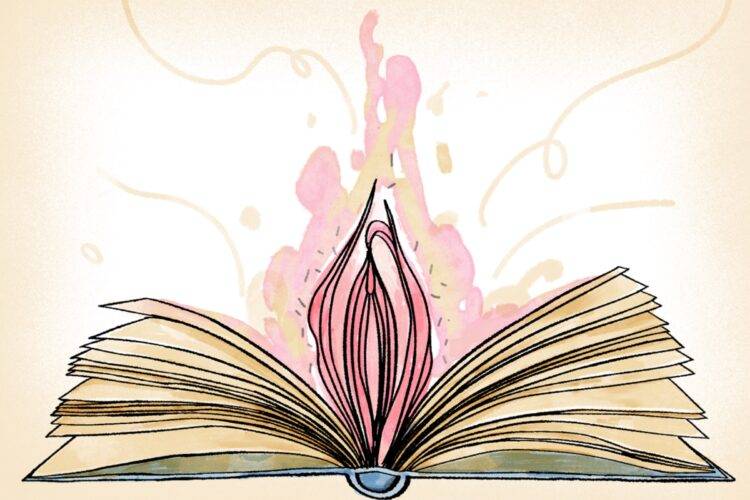
What books has BookTok been recommending to you? Currently TikTok is saturated with “spicy” books. Novels of all genres with heavily recurring sexual content have moved out of the hidden corners of the bookstore to the top spots of bestseller lists. This shift from the private and the pulp to the widespread and the acclaimed has engaged readers in a profound ideological debate. Why is erotica having such momentum in the digital and cultural space?
The history of literature is no stranger to the long-standing tradition of erotica. From the Kama Sutra to the controversial sadomasochistic novels of Marquis de Sade and Anaïs Nin’s breakthrough feminist journals, sex has been a topic of interest to many. What contemporary readers are experiencing today as a boom in erotica is the culmination of a literary movement that has become visible and permissible after the sexual revolution and its subsequent ripples. Gen Z and Millennial book lovers have not invented anything new, but rather, have given a platform to what was taboo.
At the 2024 Printers Row Lit Festival in Chicago, author Veronica Roth cited Natalie Kononenko and said, “Every time a folk story is told, it’s adapted to the time and the place, the performer and the audience. Through folklore, we can learn about a people: what matters to them, how they see themselves in relationship to other groups and to the world, and even how they perceive what it is to be human.” This concept is not exclusive to folklore. All literature is a reflection of the belief system of a specific group of people constrained to a defined moment in time. Therefore, a contemporary spotlight on erotica is the physical and conceptual manifestation of this generation’s unique approach to exploring the timeless impulse of human intimacy. The shift toward mainstream acceptance of erotica is a compound of the intersection between female liberation, sexual liberation, and the internet’s ability to fight censorship.
The internet is the foundation of modern democratic discourse. It creates a marketplace of ideas where people can connect and clash despite physical distance. This is essential to communities with “unusual” interests like sex. People who once thought they were alone in a belief or an interest can congregate in the digital space and have conversations that sustain an idea. Our current understanding of sex would not be the same without the internet’s service as a space where people can ask questions and dispel traditional myths.
The phrase “spicy books” is a euphemism (like “smut” or “seggs”) that developed as coded language to circumvent TikTok’s community guidelines against sexually explicit language. These “spicy books” have become so widely consumed and recommended because social media culture enables it. Never before have so many openly vocal lovers of sex been able to congregate and speak to each other; never before have there been so many sexually open people in history who are unbound by geography, and who can share ideas because of technology and the shared culture of globalization.
And capitalism has found a way to profit off of it. That is the last key piece of this puzzle. Social media like BookTok and Instagram (and the original YouTube literary community) are broadcasters of information, and corporations have been able to monetize it. An interest (like sex) has become a product that can evolve into a serialized product — a book; a book series; a genre; a franchise with branches of tangential money-making products like merchandise or movies.
On one hand, yes, erotica has been promoted and normalized as part of the changing cultural conversation around sexuality. On the other hand, erotica has also been promoted and normalized because the publishing industry has discovered this genre carries purchasing power.
The book “Fifty Shades of Grey” (2011) by E.L. James is often pointed to as the birthplace of “Mommy Porn” — a term for erotica primarily read by middle-aged women. “Fifty Shades of Grey,” with its subpar dialogue, flat characters, and doubtful plot, was a meme in the literary community, but this book had already sold more than 35 million copies by 2019. The 2015 movie adaptation of “Fifty Shades of Grey” grossed a total of $570.8 million dollars in the box office, and the movie trilogy as a franchise made a total of $1.324 billion dollars. “Mommy Porn” sold, and it sold well.
“Mommy Porn” was successful in the 2010s because of sexual stigma. Mothers, who have been traditionally dissuaded from engaging in sexual content, had the liberty to discreetly enjoy their sexuality from the safety of literature. Reading is perceived to be a respectable and intellectual endeavor due to classist biases, so these women could satisfy their sexual interests while upholding the social expectation of being a virtuous woman reading a book. “Mommy Porn” sold because it was a liberating, safe, socially acceptable keyhole into “spicy” content — and that appeal still exists today.
In 2024, there is less stigma about women having an interest in sex, but the stigma still exists. Women who read erotica now follow their predecessors by benefitting from the safety of masking in unsafe settings with the unique opportunity to openly celebrate sex on the internet. “Mommy Porn” walked so erotica could run. Erotica has gone viral on BookTok as young (queer and POC) women have embraced the digital tools to amplify their voices and communities. “Spicy” BookTok has become the contemporary embodiment of sexual liberation and the future of literary freedom.
Visit Fnewsmagazine.com for Part II of Slut Saga’s conversation on erotica. The next article will challenge your pre-assumptions on erotica’s literary merit, and we’ll question who has the power to decide if a genre is “entertainment” and why being branded “entertainment” is not a bad thing.







